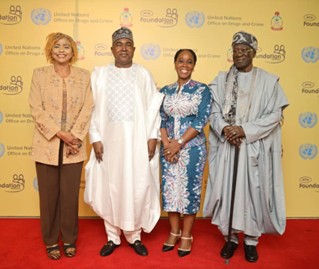Telecom
MTN Foundation, NDLEA, UNODC Unite in Abuja Against Substance Abuse

As part of activities commemorating the International Day Against Drug Abuse and Illicit Trafficking, the MTN Foundation, in partnership with the National Drug Law Enforcement Agency(NDLEA) and the United Nations Office on Drugs and Crime (UNODC) hosted a national conference in Abuja under the banner of its Anti-Substance Abuse Programme (ASAP).

The event, which took place on Thursday, 26th June 2025, at State House, Abuja, brought together stakeholders across government, civil society, the diplomatic corps, and the private sector to spotlight Nigeria’s fight against substance abuse.
The President of the Federal Republic of Nigeria, His Excellency, Bola Ahmed Tinubu GCFR, represented by The Secretary to the Government of the Federation (SGF), Senator George Akume, stated, “World Drug Day isa wake-up call. It urges us to take urgent, evidence-based action to confront illicit drug use and trafficking—crises that continue to destroy lives, shatter families, and undermine the very fabric of our communities.” He concluded by saying, “This is not just the responsibility of the government, it is a shared human duty—to ensure that the road to recovery is accessible for all.”
Representing Dr. Mosun Olusoga, Chairman of the MTN Foundation, Prof. Ifeoma Okoye, Non-Executive Director, MTN Foundation, also added, “This is all our fight, and we need to play a part in sensitising communities and developing new policies to counter this scourge.
“At our Foundation, we’re facilitating discussions at stakeholder conferences likethis, educating communities in collaboration with the National Youth Service Corps (NYSC) and hosting a quiz competition to increase awareness among 86,400students and 1,440 teachers from 144 public secondary schools in 12 States.
“This of course, is in addition to the advocacy walks in tertiary institutions across Abuja, Enugu, Kano, and Lagos States, and our partnership with the NDLEA on their 24/7 toll-free psycho-social support helpline for affected youth.”
Brig. Gen. Mohammed Buba Marwa (Rtd), Chairman of NDLEA, highlighted the role of the NDLEA and welcomed the continued support of partners like the MTN Foundation and the UNODC. “To battle the scourge of drugs, which has been linked to terrorism and banditry, prevention remains the most proactive approach in the fight against drug intakeand traffic in our communities.
“The importance of prevention is the fight against illicit drugs. We have seen the case of people using drugs rise globally. The World Drug report of 2024 states that drug use globally has increased significantly to 209 million people, a 20% rise over the last decade.
“The costly practices of drugs in terms of death and toll on individuals are high. We learnt from the World Drug Report of 2022 that drug use abuse killed almost half a million people in 2019. This should sound an alarm bell that something must be done,” he stated.
Other highlights from the event included a youth-led drama performance by the University of Abuja Theatre Group, a documentary screening on the effects of drug abuse, and a prize presentation to the winners of the inter-secondary school essay competition. The programme also featured remarks from a young person with lived experience, Saadatu Usman Mohammed, and a guest lecture delivered by Dr. Abubakar Salami.
Since its launch in2019, ASAP has worked to combat substance abuse through sustained behavioural change campaigns, advocacy, and educational outreach targeted at young Nigerians. The 2025 conference reaffirmed the foundation’s role as a committed partner in supporting national efforts to reduce the prevalence of drug abuse across the country.
Telecom
NCC Orders Telcos Inform Subscribers of Data Breach within 48 Hours

Nigerian Communications Commission (NCC) has directed telecom operators in the country to notify affected customers of any data breach within 48 hours ( that is two day) of detecting such unauthorised infringement.

This directive was contained in the revised Internet Code of Practice 2026 by the NCC, on Friday.
The document seeks to define the rights and obligations of telecom operators in handing the rights of internet users to an open internet.
In the move to protect customer information, Mobile Network Operators (MNOs) and Internet Service Providers (ISPs) are to take necessary measures to protect customers’ data from unauthorised use, disclosure, access or breach.
Telecom operators must now notify affected customers within 48 hours of detecting a compromise through text message, email or any other effective means. As contained in Chapter 3.4 of the regulation titled “Data Breach Notifications,”
The telecoms companies are also directed to notify the NCC of such a breach not later than 48 hours after determining such a breach.
“Where full details of the breach are not immediately available, the provider shall issue a preliminary notification within the same period and furnish a comprehensive update within Fourteen (14) days thereafter, or within such extended period as the Commission may approve,” part of the section reads.
The guidelines, according to NCC, are in tandem with the provisions contained in the Nigerian Data Protection Act 2023 and Part VI of Schedule 1 of the Consumer Code of Practice Regulations 2024.
The regulation also joins other agencies’ policies, ensuring protection. Agencies such as the Nigeria Data Protection Commission (NDPC) and the Federal Competition and Consumer Protection Commission (FCCPC) protect consumers against misuse of personal data, identity theft, financial loss, and reputation damage.
The review comes at a time when privacy becomes core amid frequent breaches and illegal harvest of data such as biometric, national IDs, financial information, traffic and usage, and others.
Regulations are necessary for the proper handling, consent, and regulatory compliance regarding sensitive data, ensuring it is only processed for legitimate purposes.
Under Chapter 3.5, the Internet Code of Practice 2026 addressed the handling of harvesting of transactional data by notifying and getting approval from the NCC of any usage by a third party. It noted that the NCC approval will be defined by a review and assessment of such access and “its potential effects on national considerations, consumer information and personal data.”
Telecom
Globacom Promotes Valentine Gifting with Huge Discounts on Smartphones

Globacom has announced a Valentine Smartphone promotion, which provides incredible savings on a variety of high-end smartphones from top manufacturers including Tecno, Samsung, and Infinix.

Starting on February 9, the promotion provides substantial price reductions on a number of Samsung models, including the Galaxy Z Fold 7, Galaxy A07, Galaxy A56 5G, Galaxy A36 5G, and Galaxy A26 5G. Customers who buy any of the phones will also receive a complimentary travel pouch and charger, as well as up to 18GB of extra data for six months, only available on the Glo network.
Along with other Infinix models, Tecno devices are also offered at attractive discounts, giving customers a large range of smartphones to fit a variety of tastes and price ranges.
The goal of the Glo Valentine promotion is to provide customers with the best possible deals on carefully chosen smartphones that are renowned for their cutting-edge technology, stylish designs, and dependable performance. The offer, which includes alternatives to suit a range of budgets and lifestyles, reaffirms Globacom’s dedication to customer happiness, digital adoption, greater data usage, and client centricity.
The company revealed that the promotion aligned with customers’ expectations during celebratory seasons, when demand is highest for quality smartphones at affordable prices. The company added that its partnership with trusted global and regional brands such as Samsung, Infinix, and Tecno ensures that customers enjoy premium features without compromising on value.
“The Valentine season is about connection, and what better way to stay connected than with a smartphone that fits your needs and aspirations,” the company stated. “This promo gives our customers the chance to get their dream smartphones at some of the best prices of the year, along with generous data bonuses to keep them connected,” the company disclosed.
Customers are encouraged to visit Gloworld outlets nationwide to take advantage of the Valentine Smartphone Promo while stocks last.
Telecom
GBB Expands Broadband to 13 Underserved Communities In 2025

Galaxy Backbone Limited (GBB) has recorded a significant milestone in Nigeria’s digital transformation journey by advancing broadband connectivity to 13 underserved institutions and communities nationwide in 2025, reinforcing its position as the nation’s digital backbone and a trusted partner in national development.

Guided by its mandate to enable a digitally inclusive Nigeria, GBB deliberately extended connectivity to locations within reach of its infrastructure footprint, particularly institutions with strong potential for productive use but limited readiness for immediate commercial engagement. Through this effort, the organisation continues to unlock opportunity, stimulate innovation, and support sustainable growth across critical sectors of the economy.
The expansion reached three Federal Universities, two Local Government Areas, and eight Federal Secretariats, strengthening digital capabilities in education and public administration while enhancing service delivery across the country.
GBB also extended reliable broadband connectivity to strategic and cultural landmarks such as the Nnamdi Azikiwe International Airport, Abuja, underscoring its commitment to supporting national infrastructure that drives economic activity, mobility, and global connectivity.
These deployments highlight Galaxy Backbone’s resolve to bridge the digital divide and empower institutions that shape Nigeria’s future. They demonstrate the measurable national impact of GBB’s infrastructure investments and reflect the tangible progress of the Integrated Digital Transformation Strategy (IDTS), further solidifying the organisation’s role as the platform upon which government institutions and communities can confidently build their digital future.
More importantly, the milestone illustrates that GBB’s work extends beyond technology by enabling education, improving governance, supporting economic participation, and connecting citizens to opportunity.
The initiative aligns with the Federal Government’s broadband penetration objectives and complements national programmes such as Project 774 – Universities’ Hostel Connectivity, ensuring coordinated, scalable, and sustainable impact across the country. Commenting on the achievement, Galaxy Backbone noted that every new connection brings Nigeria closer to a more inclusive digital economy while reinforcing the infrastructure required for innovation and national competitiveness.
As implementation continues, GBB remains committed to expanding access, pushing boundaries, and delivering on the promise of a fully digital nation, with further updates expected as additional phases of the deployment progress.
Galaxy Backbone Limited is the Federal Government’s digital infrastructure and shared services provider, dedicated to delivering secure, reliable, and scalable ICT solutions that support efficient governance, innovation, and sustainable national development.

 E-Financial3 days ago
E-Financial3 days agoBillions in Nigeria’s Reserves, But Where is the Growth?

 Telecom3 days ago
Telecom3 days agoQNET unveils ‘Energize Everyday’ theme, intensifies consumer protection, media partnership in 2026

 News2 days ago
News2 days agoNITDA Explores Partnership with Trust Stamp on Digital Trust and Innovation

 E-Financial2 days ago
E-Financial2 days agoNAICOM Targets Resilient, Global Competition Market in Insurance Sector Consolidation

 E-Financial3 days ago
E-Financial3 days agoAdedeji, NRS Boss says Technology is Crucial to Tax Reform’s Success

 E-Business3 days ago
E-Business3 days agoKaspersky Reports 15% Growth in Malicious email Attacks in 2025

 News3 days ago
News3 days agoNDIC Moves to Boost Customers’ Confidence in Nigerian Banks

 General News3 days ago
General News3 days agoRussia Blocks WhatsApp, Pushes State App Max as Alternative Amid Telegram Clampdown























